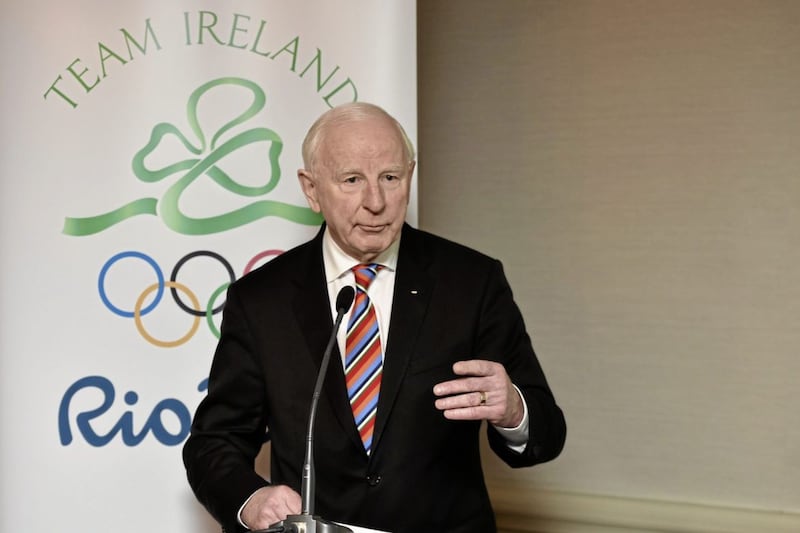IRISH boxing prides itself on winning 16 medals at the Olympics.
However, the count would now be 20 if the current rules governing the awarding of Olympic boxing medals were in place for the 1924, '28, '32 and '48 games. The forgotten men of Ireland’s Olympic boxing history - Patrick Dwyer, Frank Traynor, Jim Murphy and Mick McKeon - were the first Irish boxers to reach Olympic semi-finals up to that point.
But the 1952 Olympiad in Helsinki marked the first occasion where losing semi-finalists were awarded bronze. Prior to Helsinki, losing semi-finalists had to box-off for third place. Tipperary’s Paddy Dwyer, Army BC, beat Great Britain’s Richard Basham, Anton Cornellus of the Netherland’s and Francois Stauffer of Switzerland to reach the last-four at Paris 1924, Ireland’s first Olympics as an independent state.
But he lost his semi-final to Argentina’s Hector Mendez, the eventual silver medalist. The Thurles welter sustained a deep cut on his forehead in that bout as a result of a head butt, according to reports - and had to cede a walkover to Canada’s Douglas Lewis in the bronze medal box-off.
Four years later, at Amsterdam 1928, Dublin bantamweight Frank Traynor, St Paul’s BC, beat Fuji Okamato of Japan and Carmelo Robledo of Argentina to make the semi-finals, but was beaten in the last-four by Italy’s Vittorio Tamagnini, the eventual gold medalist. Traynor lost the box-off to Harry Isaacs of South Africa on points.
A third Irish fighter, Cork’s Jim Murphy (Army/Garda), reached the light-heavy semi-finals at Los Angeles 1932, but the injury jinx struck again. Murphy received a bye into the quarter-finals in LA and beat John Miller of the USA.
However, he had to retire injured in the first round versus Italy’s eventual silver medalist Ginno Rossi in the semi-finals. The injury kept him out of the bronze medal box-off against Peter Joergensen of Denmark. Irish sport didn’t enter the 1936 games in Berlin.
Ireland sent an eight-strong boxing squad to London 1948, where Mick McKeon (ITC) reached the last-four. The Irish middleweight beat John Keenan (Canada), Hossein Toussi (Iran) and Aime-Joseph Escudie (France) on his way to the business end of the tournament, but lost to Great Britain’s eventual silver medalist Johnny Wright. McKeon ceded a walkover in his box-off with Ivano Fontano of Italy because of an injury sustained versus Wright. The London Games of that year marked the last Olympics to feature bronze medal box-offs.
Four years later in Helsinki - where the great John McNally (White City) won Ireland’s first Olympic boxing medal (silver) - the rules were changed and losing semi-finalists were awarded bronze, but they had to wait.
The Finnish Boxing Association instigated the move to abolish bronze medal box-offs, a move which was rubber stamped by the International Boxing Association and given tacit approval by the IOC. But the 1952 bronze medals were presented retrospectively years later. The losing semi-finalists in Helsinki were, however, awarded certificates and their national flags were raised.
Lightweight Kevin Martin (Mount Street) and light-welterweight Terry Milligan (Shortt and Harland) also recorded wins in Helsinki and Dublin brothers Ando Reddy and Tommy Reddy (Sandymount), Peter Crotty (Clonmel), Willie Duggan (Crumlin) and John Lyttle (St George's, Belfast) also lined out for Ireland.
Belfast boxer Milligan won two bouts in 1952, against Iran and Dutch opposition, while McNally’s silver medal was the first piece of silverware Ireland had won at the Olympics since Bod Tisdall and Pat O’Callaghan struck double gold in track-and-field at the 1932 games. The USA finished top of the medals table in boxing at the 1952 games with five gold medals, one of which went to future heavyweight champion Floyd Patterson.
Irish boxing, courtesy of McNally’s sole podium finish, finally made the Olympics medals table, finishing in 13th position. So, had Dwyer, Traynor, Murphy and McKeon achieved what they achieved at any Olympics after 1948, Ireland would now have 20 Olympic boxing medals.
Unfortunately for Irish boxing and numerous other semi-finalists from other nations, the rule change arrived too late for the semi-finalists at the 1924, '28, '32 and '48 Games. All four Irish boxers finished fourth in their respective weight classes, although Murphy, according to former Irish Athletic Boxing Association president Breandán Ó Conaire, the FIBA, the then governing body for international amateur boxing, informed the IABA in a communication that Murphy had been officially placed third.
The ex-IABA president confirmed recently the communication in relation to Murphy finishing in third place was received. Meantime, the quartet also have the distinction of having lost at the same Olympics twice, albeit three times on walkovers in box-off bouts because of injuries and once in an actual box-off.
In 2002, a plaque was erected in Limekill Lane in Thurles in memory of Patrick Dwyer, Ireland's first boxer to reach an Olympic semi-final. Dwyer was also coach to the Irish team at the 1928 games.








